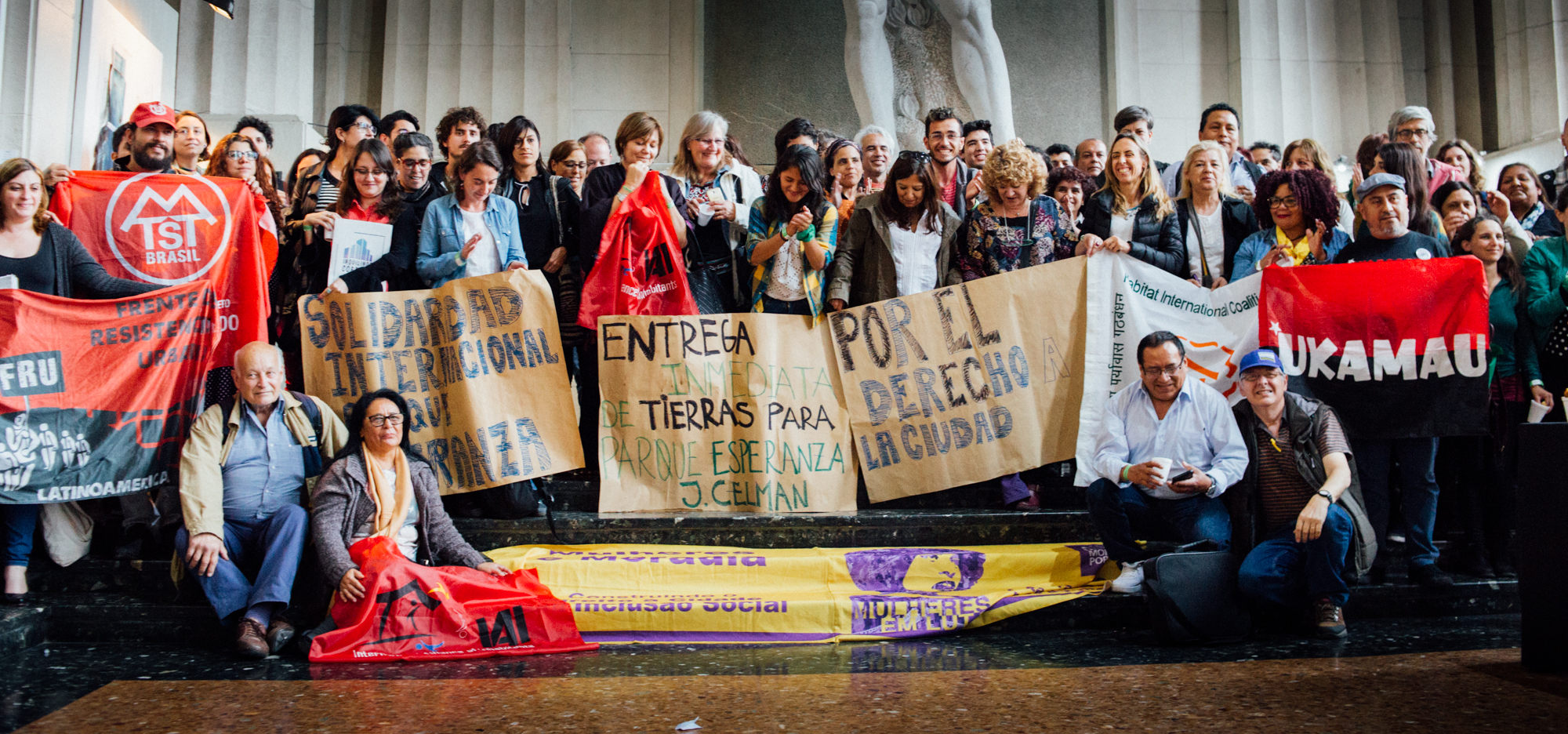The Global Platform for the Right to the City was in Buenos Aires with organizations, movements and people, academics and local governments networks committed to territorial social justice on the occasion of the International Meeting for Equal Cities (EipCI). This meeting took place from the 28th to the 31st of October, parallel to the Urban 20 Summit, in order to show and discuss an alternative position to neoliberal urban management and to exchange ideas and experiences on the cities we aspire to in this international context of economic, social, environmental and political crisis.
The meeting had the support of two exceptional women committed to human rights: Ada Colau, the mayoress of Barcelona, who called for “working in the articulation between social movements and local governments to defend democracy, diversity, equality and freedom “; and Leilani Farha, special rapporteur on the right to adequate housing, who stressed that “Housing must be a central theme in Urban 20 and G20, as it is the battleground of the 21st century. Housing is a Human Right, not a commodity #MaketheShift ”
The EipCI program featured multiple activities in a variety of formats, from cultural activities, the eviction tour, the international tribunal on evictions, the tour of cooperatives, thematic workshops and the assembly of social organizations.
The Platform co-organized several activities around the Right to the City, together with the Public Defender’s Office of the City of Buenos Aires, Asociación Civil por la Igualdad y la Justicia (ACIJ) and Centro de Estudios Legales y Sociales (CELS). Among the highlights were:
1) Working Meeting with the participation of 20 organizations. In this meeting, the vision and mission of the platform was made known, advocacy strategies were shared and it was agreed to continue adding forces to put the Right to the City at the center of public policies.
2) The workshop “Understanding and Implementing the Right to the City” was attended by more than 80 people from different countries who divided into discussion groups. This workshop reflected on the concept and implementation of this right from different perspectives, such as democratic management, feminism and the future of work, among others.
Jailson de Sousa e Silva, founder of the Observatory of Favelas (Rio de Janeiro): “The spirit of the city is produced in the peripheries”.
3) The Panel “Challenges in the Right to the City Agenda” was then held as a closing of the workshop. Horacio Corti (General Defender of the City of Buenos Aires) Nelson Saule Junior (Pólis Institute/ Global Plataform for the Right to the City), Maria Silvia Emanuelli (Habitat International Coalition), Luna Miguens (Centro de Estudios Legales y Sociales – CELS) and Sebastián Pilo (Asociación Civil por la Igualdad y la Justicia – ACIJ), spoke, with the panel moderated by Eduardo Reese (Centro de Estudios Legales y Sociales – CELS).
Horacio Corti: “The Right to the City is a light that guides us in this moment of so much darkness in Latin America”.
Nelson Saule: “At this juncture that seeks to demonize human rights, we must remain firm in the defense of democratic, just and inclusive cities from the perspective of the Right to the City.
4) The International Meeting for Equal Cities, with thematic workshops, assembly of social organizations and the closing panel with national and international mayors. At the close of this meeting, the Declaration for a Common Commitment for Egalitarian Cities was shared, which emphasizes that “The Right to the City reaffirms, updates and defends Human Rights and the corresponding state obligations. Cities are a place for all.”
On 31 October, coinciding with the last day of the Meeting, the campaign and declaration for the World Day for the Right to the City was launched. In this document, social movements, civil society organizations and local governments agreed to celebrate World Day for the Right to the City on that day, reinterpreting the United Nations designation of World Cities Day. The reason for this decision is simple: it is not enough to celebrate cities. In addition, we we launched an urgent appeal to the United Nations and all international, regional, national and local institutions, civil society organizations and inhabitants all over the world to go one step further and embrace the Right to the City as a collective path to build just, inclusive, peaceful and sustainable cities for all.
Nelson Saule explains it in a video: “Today we celebrate the World Day of the Right to the City because we defend that the implementation of the New Urban Agenda and the Objectives of Sustainable Development must take into account the vision of the Right to the City”.
News of the Event in the Press (in Spanish):
https://www.tiempoar.com.ar/nota/el-domingo-arranca-la-contracumbre-al-urban-20
http://www.unsam.edu.ar/tss/extractivismo-urbano/
http://www.noticiasurbanas.com.ar/noticias/arranco-nel-encuentro-de-ciudades-igualitarias/





